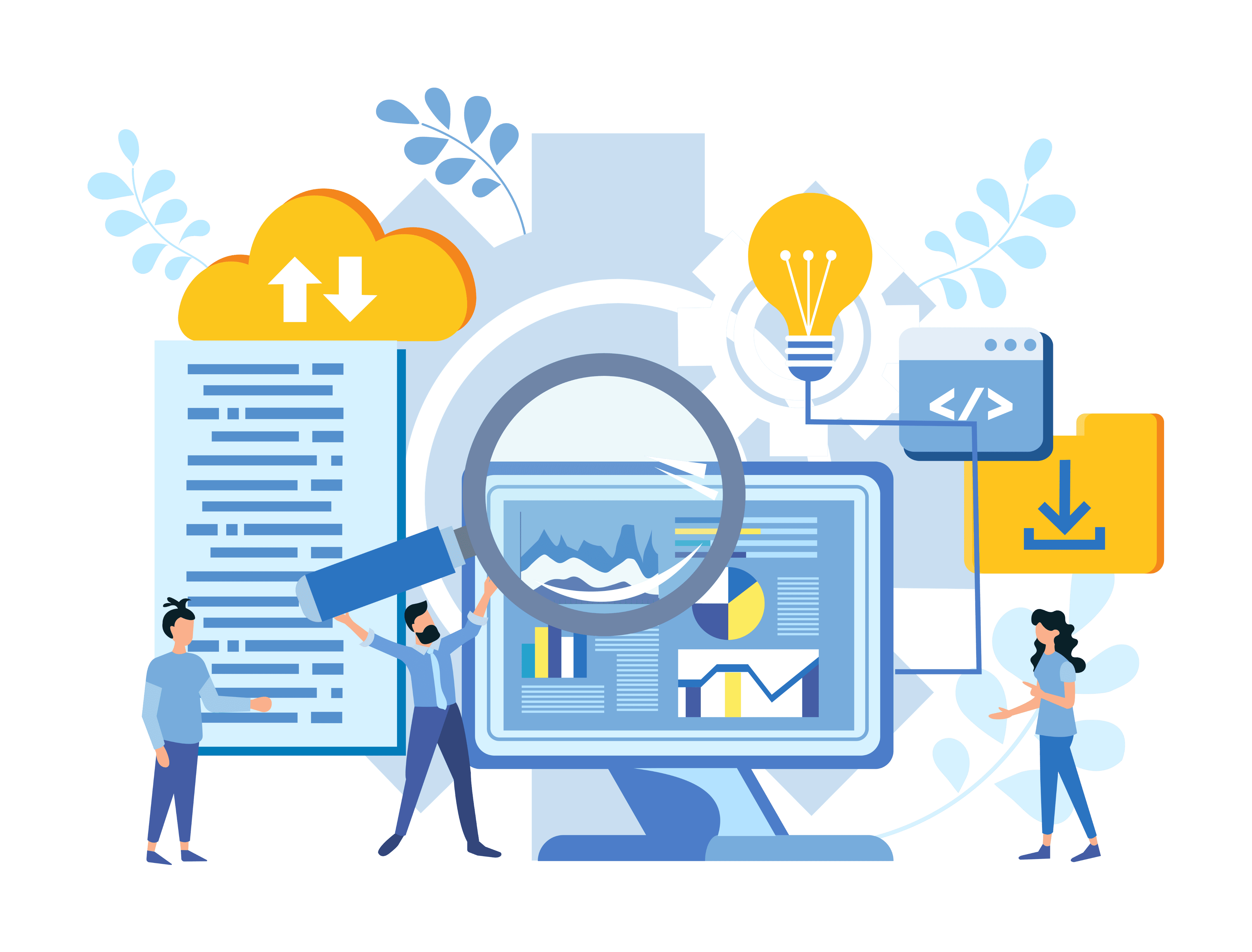Why ERP software is Important for your business!

As businesses grow and expand, it becomes increasingly important to streamline operations and improve efficiency. One way to achieve this is through the implementation of ERP (Enterprise Resource Planning) software. In this blog article, we’ll discuss why ERP software is important for your business and how it can benefit you.
ERP software for your business
- Centralized Data Management
One of the key benefits of ERP software is that it provides a centralized system for managing data. Instead of having information spread out across multiple systems and departments, everything is stored in one place. This allows for easy access to critical information and reduces the risk of errors or discrepancies.
- Improved Efficiency
With ERP software, business processes can be automated and streamlined, resulting in improved efficiency. Tasks such as inventory management, order processing, and accounting can all be automated, freeing up staff to focus on more strategic tasks.
- Better Decision Making
ERP software provides real-time visibility into business operations, allowing for better decision-making. With access to up-to-date information on everything from inventory levels to customer orders, management can make informed decisions quickly and effectively.
- Increased Collaboration
ERP software encourages collaboration by providing a single system for employees to work from. This makes it easy for different departments to communicate and share information, reducing the risk of miscommunication and ensuring that everyone is working towards the same goals.
- Scalability
As businesses grow and expand, ERP software can easily scale to meet their needs. Whether you’re adding new employees or expanding to new markets, ERP software can be customized to fit your specific requirements.
- Better Customer Service
With ERP software, customer service can be improved by providing staff with access to real-time customer data. This allows them to quickly resolve issues and respond to inquiries, resulting in a better customer experience.
- Cost Savings
Implementing ERP software can result in significant cost savings. By automating tasks and streamlining processes, businesses can reduce the amount of time and resources required to complete them. Additionally, with better decision-making capabilities, businesses can make more informed decisions that lead to cost savings over time.
How does ERP software work?
ERP software uses a computer system to communicate with other systems in your business. This communication can involve taking data from various sources, such as reports from your accounting department or sales data from your customer service team. ERP software then uses this data to create diagrams and graphs showing how your business performs. This information can then be used to make decisions about improving the business structure so that it operates more efficiently.
The basic workflow of an ERP system is as follows:
Data Collection: ERP software gathers data from various sources within the business, such as sales orders, invoices, inventory data, and employee information.
Data Integration: The data is then integrated into a single, unified database. This allows for real-time access to data from different departments and functions within the business.
Data Analysis: The integrated data is analyzed using a variety of tools and techniques, such as data mining, business intelligence, and reporting. This allows businesses to gain insights into their operations and make informed decisions.
Process Automation: ERP software can automate many of the routine and repetitive tasks involved in business operations. For example, it can automatically generate purchase orders based on inventory levels or schedule employee shifts based on workload.
Reporting and Dashboards: ERP software typically includes reporting and dashboard features that allow businesses to track and monitor their performance in real-time. This enables businesses to make adjustments and optimize their operations as needed
What are the benefits of using ERP software?
ERP software often has several benefits for businesses of all sizes: It can help you save money on goods and services bought online, reduce costs associated with employee training and development, improve productivity at your company, and more!ERP software is an essential tool for businesses of all sizes. By providing a centralized system for managing data, improving efficiency, and enabling better decision-making, ERP software can help businesses achieve their goals and stay competitive in today’s fast-paced business environment.ERP software offers businesses many benefits, including streamlined operations, centralized data, improved collaboration, better decision-making, increased scalability, enhanced customer service, and cost savings. By automating routine tasks and providing real-time visibility into operations, businesses can improve efficiency, reduce errors, and make more informed decisions.
Why ERP software is Important for your business!

As businesses grow and expand, it becomes increasingly important to streamline operations and improve efficiency. One way to achieve this is through the implementation of ERP (Enterprise Resource Planning) software. In this blog article, we’ll discuss why ERP software is important for your business and how it can benefit you.
ERP software for your business
- Centralized Data Management
One of the key benefits of ERP software is that it provides a centralized system for managing data. Instead of having information spread out across multiple systems and departments, everything is stored in one place. This allows for easy access to critical information and reduces the risk of errors or discrepancies.
- Improved Efficiency
With ERP software, business processes can be automated and streamlined, resulting in improved efficiency. Tasks such as inventory management, order processing, and accounting can all be automated, freeing up staff to focus on more strategic tasks.
- Better Decision Making
ERP software provides real-time visibility into business operations, allowing for better decision-making. With access to up-to-date information on everything from inventory levels to customer orders, management can make informed decisions quickly and effectively.
- Increased Collaboration
ERP software encourages collaboration by providing a single system for employees to work from. This makes it easy for different departments to communicate and share information, reducing the risk of miscommunication and ensuring that everyone is working towards the same goals.
- Scalability
As businesses grow and expand, ERP software can easily scale to meet their needs. Whether you’re adding new employees or expanding to new markets, ERP software can be customized to fit your specific requirements.
- Better Customer Service
With ERP software, customer service can be improved by providing staff with access to real-time customer data. This allows them to quickly resolve issues and respond to inquiries, resulting in a better customer experience.
- Cost Savings
Implementing ERP software can result in significant cost savings. By automating tasks and streamlining processes, businesses can reduce the amount of time and resources required to complete them. Additionally, with better decision-making capabilities, businesses can make more informed decisions that lead to cost savings over time.
How does ERP software work?
ERP software uses a computer system to communicate with other systems in your business. This communication can involve taking data from various sources, such as reports from your accounting department or sales data from your customer service team. ERP software then uses this data to create diagrams and graphs showing how your business performs. This information can then be used to make decisions about improving the business structure so that it operates more efficiently.
The basic workflow of an ERP system is as follows:
Data Collection: ERP software gathers data from various sources within the business, such as sales orders, invoices, inventory data, and employee information.
Data Integration: The data is then integrated into a single, unified database. This allows for real-time access to data from different departments and functions within the business.
Data Analysis: The integrated data is analyzed using a variety of tools and techniques, such as data mining, business intelligence, and reporting. This allows businesses to gain insights into their operations and make informed decisions.
Process Automation: ERP software can automate many of the routine and repetitive tasks involved in business operations. For example, it can automatically generate purchase orders based on inventory levels or schedule employee shifts based on workload.
Reporting and Dashboards: ERP software typically includes reporting and dashboard features that allow businesses to track and monitor their performance in real-time. This enables businesses to make adjustments and optimize their operations as neede
What are the benefits of using ERP software?
ERP software often has several benefits for businesses of all sizes: It can help you save money on goods and services bought online, reduce costs associated with employee training and development, improve productivity at your company, and more!ERP software is an essential tool for businesses of all sizes. By providing a centralized system for managing data, improving efficiency, and enabling better decision-making, ERP software can help businesses achieve their goals and stay competitive in today’s fast-paced business environment.ERP software offers businesses many benefits, including streamlined operations, centralized data, improved collaboration, better decision-making, increased scalability, enhanced customer service, and cost savings. By automating routine tasks and providing real-time visibility into operations, businesses can improve efficiency, reduce errors, and make more informed decisions.
Related Blogs

Empower Manufacturing With ERP
ERP software can help empower manufacturing by automating processes, streamlining workflows, and increasing efficiency.

ERP For Business: What is it and What are the benefits?
A lot of businesses invest a lot of time and money into their business, but when it comes to the important task of keeping track of their business transactions they use a spreadsheet,

Top 10 ERP Software for Automating Business Requirement
ERP software is a type of software that helps manage and track business requirements.

WHAT IS ENTERPRISE RESOURCE PLANNING | HOW DOES ERP SOFTWARE WORK | AVAILABLE ERP SOFTWARE
ERP is a critical piece of business software. It can help you manage your finances, track employees, and more.
Related Blogs

Empower Manufacturing With ERP
ERP software can help empower manufacturing by automating processes, streamlining workflows, and increasing efficiency.

ERP For Business: What is it and What are the benefits?
A lot of businesses invest a lot of time and money into their business, but when it comes to the important task of keeping track of their business transactions they use a spreadsheet,

Top 10 ERP Software for Automating Business Requirement
ERP software is a type of software that helps manage and track business requirements.

WHAT IS ENTERPRISE RESOURCE PLANNING | HOW DOES ERP SOFTWARE WORK | AVAILABLE ERP SOFTWARE
ERP is a critical piece of business software. It can help you manage your finances, track employees, and more.
